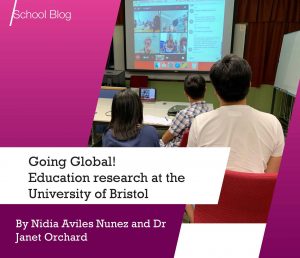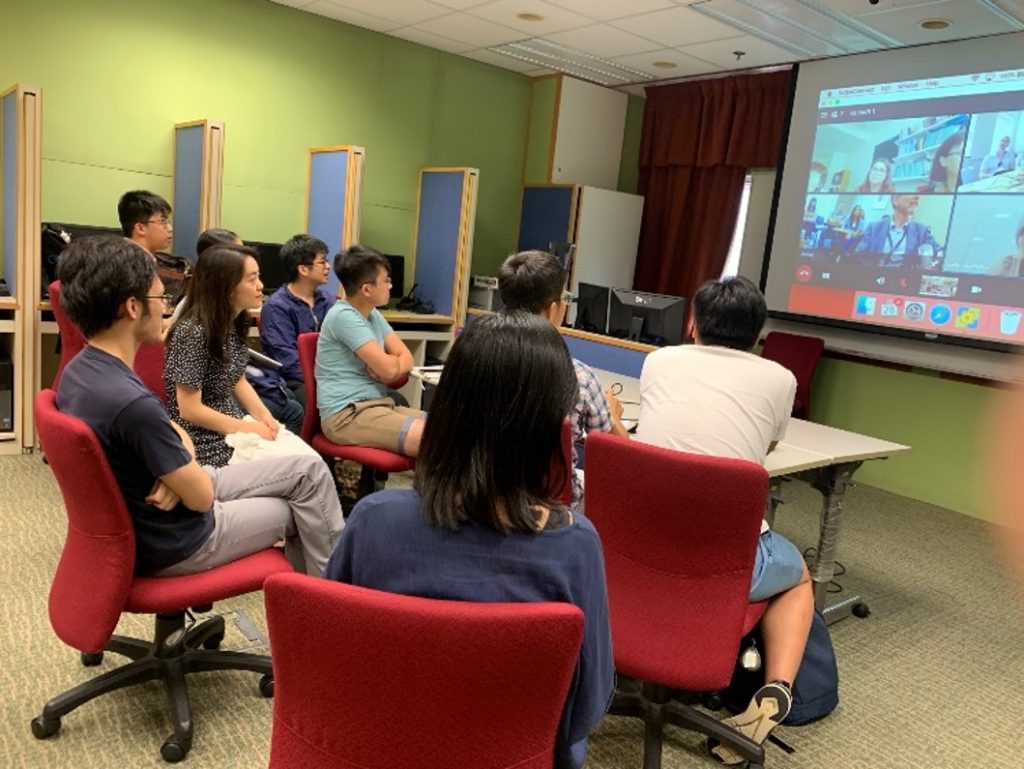 Blog post by Nidia Aviles Nunez, PG, Education, School of Education, University of Bristol and Dr Janet Orchard, School of Education, University of Bristol
Blog post by Nidia Aviles Nunez, PG, Education, School of Education, University of Bristol and Dr Janet Orchard, School of Education, University of Bristol
There have been so many low points to life in a pandemic over the past year, we were keen to share one positive opportunity we have enjoyed from engaging in online video conversations with people on the other side of the world. We have been involved in a dialogue between teachers and teacher educators based in Bristol and in Hong Kong called ‘Going Global’, building on an earlier round of dialogues pre-pandemic also including pre-service teachers from Stellenbosch, South Africa.
Going Global
Translating an already successful dialogical pedagogy used with young people in schools and youth groups to the context of higher education, Going Global builds on the established success of Generation Global. This not-for-profit educational organisation brings together school students aged 13-17 from over 30 different countries and across religious and cultural divisions to talk about things that matter to them, engaging in what are sometimes ‘difficult dialogues’. Generation Global is also a long-time user of online video-conferencing, a further reason for drawing on their experience at a time of lockdown during a pandemic.
Going Global takes that model as a starting point, extending and adapting it to the context of pre- and in-service teacher education, recognising the particular needs of adults rather than children as learners. To date, Going Global has involved participants from the Universities of Bristol, the Chinese University of Hong Kong, the Queen’s University, Belfast and Stellenbosch University.

Going Global exposes early career teachers to cultural complexity, diversity and uncertainty within a supported space. It requires them to navigate dialogue with others by engaging globally on-line according to a modified version of the established Generation Global model. This overlap with learning about pedagogy is important because it justifies a place for this activity on an already crowded teacher education curriculum. Clearly it has potential too for developing teachers’ digital literacy.
‘Otherness’ through the online environment
A key concern of the Going Global initiative has been that of encountering ‘otherness’ through the online environment. Learning from experience and doing, it aims to promote knowledge, understanding, dispositions and skills that will help participants navigate difference in their professional lives in a way that is peaceful and constructive. The potential of encountering ‘otherness’ online seems particularly apt given the concerns highlighted by the Black Lives Matter (BLM) Movement which have also come to the fore during the pandemic. Concerns have been raised before about the unintended racism implicit in established notions of dialogue as a consequence of ‘white ignorance’ (Chetty, 2018). Working together on Going Global has been a small step towards addressing those problems.
Intercultural understanding and awareness
There are also well-established benefits of Computer Supported Collaborative Learning (CSCL) for experiences of learning and teaching more generally (Stahl, 2017; Wegerif, 2006). By comparison, far less is known about its benefits to cognitive engagement in intercultural dialogue, particularly in a higher education setting. That is why, in the short-term, our relatively modest aims have been to test whether or not the initiative can work at all and if so, what we might gain from the experience. In the longer-term, our agenda centres on the promotion of intercultural understanding and awareness in new and beginning teachers through digital learning, in ways which promote safe and positive on-line behaviours rather than risky and potentially harmful ones.
One final aspect of the project we wanted to report, led by the Chinese University of Hong Kong, has been how we have explored the use of ‘visual methodology’ on Going Global to analyse the teacher participants’ reflections. Visual methodology, we maintain, enables participants to ‘craft’ their personal experience in ways that help to capture hidden knowledge and feelings that might not otherwise be expressed (Orchard, Wan, Davids and Smith 2019). Given the culturally diverse group of people participating in Going Global, a further advantage of expressing reflections through drawing rather than writing has been the opportunity to escape English as the dominant mode of communication, something we have had to accept in the dialogues ourselves, as our one shared language.

Final thoughts
While this work is still at an early stage of development, we believe our use of ‘photovoice’, a participatory visual methodology wherein participants of Going Global presented photos taken by them that were meaningful of their practice (See Wan et al. 2021 for more on the use of ‘photovoice’). These photographs gave participants a chance to create democratic critical discussions that, we believe, enabled us both to promote space for fruitful professional reflection and consider how to communicate those in ways that are meaningful. We have found too that work on Going Global supports a finding of the Philosophy for Teachers initiative (P4T) that with creativity and commitment, ‘leaky spaces’ (Orchard et al 2016) or spaces in a formal agenda where an opportunity can be developed to try out dialogic elements, can be created to introduce more humanistic activity on an otherwise over-crowded and instrumental Initial Teacher Education (ITE) curriculum.
References
- Darren Chetty (2018) Racism as ‘Reasonableness’: Philosophy for Children and the Gated Community of Inquiry, Ethics and Education, 13:1, 39-54, DOI: 10.1080/17449642.2018.1430933
- Gerry Stahl (2017) Group practices: a new way of viewing CSCL, International Journal of Computer-Supported Collaborative Learning, 12, 113–126. DOI: 10.1007/s11412-017-9251-0
- Rupert Wegerif (2006). A dialogic understanding of the relationship between CSCL and teaching thinking skills, International Journal of Computer Supported Collaborative Learning 1:1, 143-157. https://www.researchgate.net/publication/29811318_A_dialogic_understanding_of_the_relationship_between_CSCL_and_teaching_thinking_skills
- Janet Orchard, Sally Wai-Yan Wan, Nuraan Davids & Sarah Smith (2019). Re-humanising Teacher Education: online international intercultural dialogue. Conference Presentation at the Global Perspectives: Re-imagining Education, University of Worcester.
- Sally Wai-Yan Wan, Carson Ki-Wing Chu, Angus Ho-Hei Cheng, Elim Sein-Yue Hui, Ken Chun-Kit Fung & Howard Hoi-Wik Yu (2021) “Getting ready to teach”: using photovoice within a collaborative action research project, Journal of Education for Teaching, 47:1, 125-130, DOI: 10.1080/02607476.2020.1841553
- Janet Orchard, Ruth Heilbronn & Carrie Winstanley (2016) Philosophy for Teachers (P4T) – developing new teachers’ applied ethical decision-making, Ethics and Education, 11:1, 42-54, DOI: 10.1080/17449642.2016.1145495
